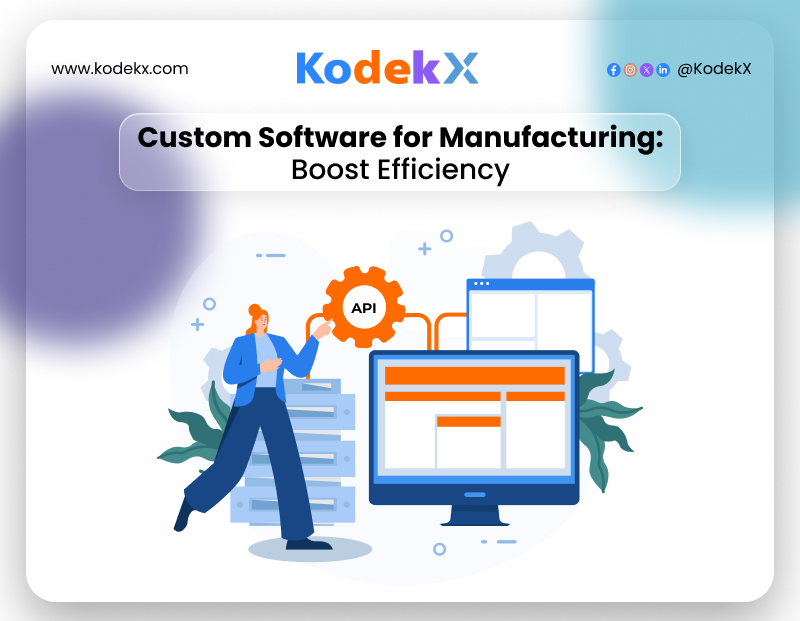In today's competitive manufacturing landscape, companies are increasingly turning to custom software solutions to streamline operations, enhance productivity, and maintain a competitive edge. Unlike Off-the-Shelf Software , custom solutions are tailored to meet the specific needs of a business, addressing unique challenges and optimizing workflows.
TL;DR / Quick Answer
Custom Software in 2025 in manufacturing offers tailored solutions that improve operational efficiency, reduce downtime, and enhance forecasting accuracy. By integrating predictive maintenance, inventory management, and IoT technologies, manufacturers can achieve significant productivity gains and cost savings.
Key Facts
- Machine Downtime Reduction: Manufacturing companies adopting custom software have reduced machine downtime by up to 50% (2024, IT Magination).
- Productivity Boost: Labor productivity has increased by 15–30% with the implementation of custom solutions (2024, IT Magination).
- Forecasting Accuracy: Custom software has improved forecasting accuracy by up to 85% in manufacturing operations (2024, IT Magination).
- Market Growth: The global custom software development market is projected to reach USD 146.18 billion by 2030, growing at a CAGR of 22.6% from 2025 to 2030 (2024, Grand View Research).
- IoT Adoption: Over 60% of manufacturers have integrated IoT technologies into their operations, enhancing real-time monitoring and decision-making (2023, Ubisense).
Understanding Custom Software in Manufacturing
Custom software refers to applications developed specifically for a business's unique requirements. In manufacturing, this can encompass systems for inventory management, production planning, predictive maintenance, and quality control. Unlike generic software, custom solutions are designed to integrate seamlessly with existing processes, offering scalability and flexibility.
Benefits of Custom Software
- Tailored Solutions: Custom software is developed to address the specific needs and challenges of a manufacturing business, ensuring a perfect fit.
- Enhanced Efficiency: By automating routine tasks and optimizing workflows, custom solutions can significantly improve operational efficiency.
- Scalability: As businesses grow, custom software can be adapted and expanded to accommodate increased demands and new functionalities.
- Competitive Advantage: Implementing unique software solutions can provide a competitive edge by enabling faster response times and more personalized services.
Common Pitfalls & Fixes
While custom software offers numerous benefits, its implementation can present challenges. Here are some common pitfalls and strategies to overcome them:
- High Initial Costs: Developing custom software can be expensive. To mitigate this, businesses should conduct a thorough cost-benefit analysis and consider the long-term savings and efficiencies gained.
- Integration Issues: Integrating new software with existing systems can be complex. Ensuring compatibility and investing in proper training can ease this transition.
- User Resistance: Employees may resist new systems. Involving them in the development process and providing comprehensive training can enhance adoption.
- Data Migration Challenges: Transferring data from legacy systems can be problematic. Employing data migration experts and thorough testing can prevent issues.
- Maintenance Requirements: Custom software requires ongoing maintenance. Establishing a clear support plan and regular updates can ensure continued functionality.
Real-World Case Examples
Case 1: CloudNC's AI-Powered CAM Assist
NeCloudNC, a UK-based tech company, developed AI-powered CAM Assist software to automate CNC machine programming. This innovation reduced programming time from hours to minutes, addressing labor shortages and enhancing productivity. Since its OpenAI Launches ChatGPT Agent , the software has attracted hundreds of U.S. clients, generating millions in licensing fees.
Case 2: Bespoke Manufacturing Solutions
A manufacturing firm implemented bespoke software tailored to its specific production processes. The custom solution streamlined operations, improved quality control, and reduced waste, leading to a significant increase in overall efficiency and profitability.
Case 3: IoT Integration for Real-Time Monitoring
A factory integrated IoT sensors into its production lines, allowing for real-time monitoring of equipment performance. This setup enabled predictive maintenance, reducing unexpected downtime and extending the lifespan of machinery.
Case 4: ERP System Customization
A mid-sized manufacturer customized its ERP system to better align with its unique workflows. The tailored ERP solution improved data accuracy, enhanced reporting capabilities, and facilitated better decision-making across departments.
Methodology
The insights presented in this article are based on a comprehensive analysis of recent industry reports, case studies, and expert opinions. Data was gathered from reputable sources, including IT Magination, Grand View Research, and Ubisense, to ensure accuracy and relevance.
Tools Used:
- Industry Reports: Grand View Research, IT Magination, Ubisense
- Case Studies: CloudNC, Bespoke Manufacturing Solutions
- Expert Interviews: Industry professionals and software developers
Data Sources:
- Grand View Research: Custom Software Development Market Report
- IT Magination: Custom Manufacturing Software Development Blog
- Ubisense: IoT Adoption in Manufacturing Survey
Data Collection Process:
- Review of published industry reports and surveys
- Analysis of case studies from manufacturing companies
- Interviews with industry experts and software developers
Limitations & Verification:
- Data is based on available reports and may not represent all manufacturing sectors
- Case studies are specific to individual companies and may not be universally applicable
- Efforts were made to verify data accuracy through multiple reputable sources
Actionable Conclusion
Implementing custom software solutions in manufacturing can lead to significant improvements in efficiency, productivity, and Beyond Compliance Businesses should carefully assess their specific needs, consider potential challenges, and collaborate with experienced developers to create tailored solutions that align with their goals.
References
Boost Manufacturing Efficiency
Streamline operations and reduce downtime with custom software.
Frequently Asked Questions
Custom software in manufacturing refers to applications developed specifically to meet the unique needs and challenges of a manufacturing business, such as inventory management, production planning, and quality control.
By automating routine tasks, optimizing workflows, and providing real-time data insights, custom software can streamline operations and reduce errors, leading to improved efficiency.
While the initial development of custom software can be costly, the long-term benefits, such as increased productivity and reduced downtime, often outweigh the expenses.
Assess your specific needs, consider scalability and integration capabilities, and consult with experienced developers to select a solution that aligns with your business objectives.
Yes, custom software can be designed to integrate seamlessly with existing systems, ensuring a smooth transition and continuity of operations.
